- Home
- Patricia Highsmith
Patricia Highsmith - The Tremor of Forgery Page 2
Patricia Highsmith - The Tremor of Forgery Read online
Page 2
As often happened, Ingham’s ruminations made him doze within twenty minutes, and after writing only twelve lines of notes, he was half asleep when the voice of the American woke him like a repeated dream:
‘Hello, there! Haven’t seen you for a couple of days.’
Ingham sat up. ‘Good afternoon.’ He knew what was coming, and he knew he would go, this evening, to have a drink at Adams’s bungalow.
‘How long’re you here for?’ Adams asked.
‘I don’t quite know.’ Ingham had stood up and was putting on his robe. ‘Maybe another three weeks. I have a friend coming.’
‘Oh. Another American?’
‘Yes.’ Ingham looked at the spear Adams was carrying, a sort of dart five feet long without apparent means of projection.
‘I’m on my way back to my bungalow. Want to come along and have a cooling drink?’
Ingham at once thought of Coca-Cola. ‘All right. Thank you. What do you do with that spear?’
‘Oh, I aim at fish and never catch them.’ A chuckle. ‘Actually sometimes I snare up shells I couldn’t reach if I were just swimming. You know, in water six or eight feet deep.’
The sand became hot inland, but still bearable. Ingham was carrying his beach shoes. Adams had none.
‘Here we are,’ said Adams suddenly, and turned on to a paved but gritty walk which led to his blue-and-white bungalow. The bungalow’s roof was domed for coolness, in Arabian style.
Ingham glanced over his shoulder at a building he had not noticed before, a service building of some sort where several adolescent boys, waiters and clean-up boys of the hotel, he supposed, leaned against the wall chatting.
‘Not much, but it’s home just now.’ said Adams, opening his door with a key he had fished from somewhere in the top of his swimming trunks.
The inside of the bungalow was cool, the shutters dosed, and it seemed dark after the sunlight. Adams evidently had an air-conditioner. He turned on a light.
‘Sit ye down. What can I get you? A Scotch? Beer? Coke?’
‘A Coke, thanks.’
They had stomped their feet carefully on the bare tiles outside the door. Adams walked briskly and squeakily across the tile floor into a short hall that led to a kitchen.
Ingham looked around. It looked like home, indeed. There were seashells, books, stacks of papers, a writing-table that was obviously much used, with ink bottles, pens, a stamp box, a pencil sharpener, an open dictionary. A Reader’s Digest. Also a Bible. Was Adams a writer? The dictionary was English-Russian, neatly covered in brown paper. Was Adams a spy? Ingham smiled at the thought. Above the desk hung a framed photograph of an American country house that looked like New England, a white farmhouse surrounded at a generous distance by a three-railed white fence. There were elm trees, a collie, but no person in the picture.
Ingham turned as Adams entered with a small tray.
Adams had a Scotch and soda. ‘You a teetotaller?’ he asked, smiling his paunchy little smile.
‘No, I just felt like a Coke. How long’ve you been here?’
‘A year.’ Adams said, beaming, bouncing on his toes.
Adams had high arches, high insteps and rather small feet. There was something disgusting about Adams’s feet, and having looked at them once, Ingham did not look again.
‘Your wife isn’t here?’ Ingham asked. He had seen a woman’s photograph on the chest of drawers behind Adams, a woman in her forties, sedately smiling, sedately dressed.
‘My wife died five years ago. Cancer.’
‘Oh.—What do you do to pass the time here?’
‘I don’t feel too lonely. I keep busy.’ Again the squirrel-like smile. ‘Once in a while someone interesting turns up at the hotel, we make acquaintances, they go on somewhere else. I consider myself an unofficial ambassador for America. I spread goodwill—I hope—and the American way of life. Our way of life.’
What the hell did that mean, Ingham wondered, the Vietnam War springing at once to his mind. ‘How do you mean?’
‘I have my ways.—But tell me about yourself, Mr Ingham. Sit down somewhere. You’re here on vacation?’
Ingham sat down in a large scooped leather chair that creaked. Adams sat on the sofa. ‘I’m a writer,’ Ingham said. ‘I’m waiting for an American friend who wants to do a film here. He’s going to be cameraman and director. The producer is in New York. It’s all rather informal.’
‘Interesting! A film on what subject?’
CA story about young people in Tunisia. John Castlewood—the cameraman—knows Tunisia quite well. He lived a few months here with a family in Tunis.’
‘So you’re a film writer.’ Adams was putting on a colourful short-sleeved shirt.
‘No, just a writer. Fiction. But my friend John wanted me to do his film with him.’ Ingham detested the conversation.
‘What books have you written?’
Ingham stood up. He knew more questions were coming, so he said, ‘Four. One of them was The Game of “If”. You probably haven’t heard of it.’ Adams hadn’t, so Ingham said, ‘Another book was called The Gathering Swine. Not so succesful.’
‘The Gadarene Swine? Adams asked, as Ingham had thought he would.
‘Gathering,’ Ingham said. ‘I meant it to sound like Gadarene, you see.’ His face felt warm with a kind of shame, or boredom.
‘You make enough to live on?’
‘Yes, with television work now and then in New York.’ He thought suddenly of Ina, and the thought caused a throb in his body, making Ina strangely more real than she had been since he got to Europe, or Africa. He could see Ina in her office in New York now. It would be noonish. She would be reaching for a pencil, or a sheet of typewriter paper. If she had a lunch date, she would be a little late for it.
‘You’re probably famous and I don’t realize it,’ Adams said, smiling. ‘I don’t read much fiction. Now and then, something that’s condensed. Like in the Reader’s Digest, you know. If you’ve got one of your books here, I’d like to read it.’
Ingham smiled. ‘Sorry. I don’t travel with them.’
‘When’s your friend due?’ Adams stood up. ‘Can’t I freshen that? How about a Scotch now?’
Ingham agreed to the Scotch. ‘He’s due Tuesday.’ Ingham caught a glimpse of his own face in a mirror on the wall. His face was pink from the sun and starting to tan. His mouth looked severe and a little grumpy. A sudden loud voice, shouting in Arabic just outside the shuttered windows, made him flinch, but he continued staring at himself. This is what Adams saw, he thought, what the Arabs saw, an ordinary American face with blue eyes that looked too sharply at everything, above a mouth not exactly friendly. Three creases undulated across his forehead, and the beginnings of wrinkles showed under his eyes. Maybe not a very friendly face, but it was impossible to change one’s expression without being phoney. Lotte had done a little damage. The best he could do, Ingham thought out of nowhere, the proper thing was to be neutral, neither chummy nor standoffish. Play it cool.
He turned as Adams came in with his drink.
‘What do you think about the war?’ Adams asked, smiling as usual. ‘The Israelis have got it won.’
‘Can you get the news? By radio?’ Ingham was interested. He must buy a transistor, he thought.
‘I can get Paris, London, Marseilles, Voice of America, practically anything.’ Adams said, gesturing towards a door, which presumably led to a bedroom. ‘Just scattered reports now, but the Arabs are finished.’
‘Since America is pro-Israel, I suppose there’ll be some anti-American demonstrations ?’
‘A few, no doubt.’ said Adams, as cheerfully as if he were talking about flowers pushing up in a garden. ‘A pity the Arabs can’t see a yard in front of their noses.’
Ingham smiled. ‘I thought you might well be pro-Arab.’
‘Why?’
‘Living here. Liking them, I thought.’ On the other hand, he read the Reader’s Digest, which was always anti-Communist On the other hand, w
hat was the other hand?
‘I like the Arabs. I like all peoples. I think the Arabs ought to do more with their own land. What’s done is done, the creation of Israel, right or wrong. The Arabs ought to do more with their own desert and stop complaining. Too many Arabs sit around doing nothing.’
That was true, Ingham thought, but since Adams read the Reader’s Digest, he suspected anything he said, and thought about it twice. ‘Have you a car? Do you think the Arabs will turn it over?’
Adams chuckled comfortably. ‘Not here. My car’s the black Cadillac convertible under the trees. Tunisia is pro-Arab, of course, but Bourguiba isn’t going to allow much trouble. He can’t afford it.’
Adams talked about his farm in Connecticut, and about his business in Hartford. He had had a soft drinks bottling plant. Adams obviously enjoyed reminiscing. His had been a happy marriage. He had a daughter who lived in Tulsa. Her husband was a brilliant engineer, Adams said. Ingham thought, ‘I’m afraid to fall in love with Ina. ‘I’m afraid to fall in love with anyone since Lotte. It was so obvious, he wondered why he hadn’t realized it before, months ago. Why should it come to him now, while talking with this ordinary little man from Connecticut? Or had he said he originally came from Indiana?
Ingham said good-bye, with a vague promise to meet Adams in the bar next day around eight o’clock, just before dinner. Adams said he sometimes took dinner at the hotel, rather than cook. As he walked back to the main building of the hotel, Ingham thought about Ina. It wasn’t bad, maybe even wise, he thought, the way he felt about her. He was not out of his mind about her. He cared for her and she was important to him. He had taken his film contract for The Game of ‘If9 to show her before he signed it, her approval being just as important to him as his agent’s. (In fact, Ina knew all about film contracts, but emotionally as well he had wanted her approval.) She was intelligent, pretty, and physically attractive to him. She was dependable and un-neurotic. She had her own work, and she wasn’t a bore or a drag—as Lotte had been, out of bed, he had to admit. Ina had some talent for playwriting. She’d have been better than him for this job, in fact, and Ingham wondered why John hadn’t suggested her doing the script instead of him? Or maybe he had, and Ina hadn’t been able to get away from New York. John and Ina had known each other a little longer than Ingham had known either of them. Ina might not mention it to him, if John had asked her to write Trio’, Ingham thought.
Suddenly, Ingham felt happier. If there wasn’t a letter from John when he got to the hotel, if there was none tomorrow, and if John didn’t come on the 13th, Ingham felt he could take it in his stride. Maybe he was acquiring the African tempo. Don’t be anxious. Let the days pass. He realized that Francis J. Adams had been curiously stimulating. The Reader’s Digest condensations! The American way of life! Adams was so plainly content with himself, with everything. It was fabulous, in these times. An Arab boy had brought fresh bath-towels while Ingham had been there, and Adams had talked with him in Arabic. The boy seemed to like Adams.
Ingham tried to imagine having lived in the hotel for a year. Was Adams some kind of American agent? No, he was much too naive. Or could that be part of his cover? One never knew these days, did one? Ingham didn’t know what to make of Adams.
3
JUNE 13th came and went. There was no word from John and, what was even stranger, no word from Ina. On the 14th, inspired by a good lunch at the hotel, Ingham cabled Ina:
WHAT’S UP? WRITE ME HOTEL REINE HAMMAMET. I LOVE YOU, HOWARD.
He sent it to CBS. At least it would be there the first thing tomorrow morning, Thursday. Ingham had been in Tunisia two weeks now without a word from John or Ina. Even Jimmy Goetz, not one for writing letters, had sent him a postcard of good luck wishes. Jimmy was off to Hollywood to write a film script of someone’s novel. His postcard had come to the Hotel du Golfe.
The days began to drag. They dragged for two days, then Ingham picked up mentally, or perhaps slowed down, so that he didn’t mind the dragging. He was making some progress in planning his novel, and had the first three chapters clearly in mind.
Ingham was now on demi-pension, so he took lunch or dinner away from the hotel, usually at the restaurant Chez Melik in the town of Hammamet, a kilometre away. He could walk to Hammamet along the beach—more pleasant if it were evening and not so warm—or take his car. Melik’s was a terrace restaurant, very cheap and informal, up some steps from the street. The terrace was shaded with grapevines, and one corner of it looked down on a strawy cattle pen, where sheep and goats sometimes stood, waiting to be slaughtered. Sometimes instead of living animals, there was a heap of bleeding sheepskins at which cats pulled, over which flies buzzed. Ingham did not always enjoy looking down there. The good thing about Melik’s was the mixed clientele. There were turbaned camel-drivers, Tunisian or French students with flutey instruments or guitars, French tourists, occasionally some British, and ordinary men from the village who lingered over their vin rose, picking their teeth and nibbling from plates of fruit until midnight. Once Adams came with him to Melik’s. Adams had been there before, of course, and was not so fond of the place as Ingham. Adams thought it could be cleaner.
Ingham had met four or five people in his hotel, but he did not care very much for any of them. An American couple had asked him to play bridge, but Ingham had told them he didn’t know how to play, which was nearly true. Another was an American named Richard Messerman, a bachelor on the prowl, but having luck, he said, only at the Hotel Fourati, a mile away, where he often spent the night. Ingham did not accept Messerman’s invitations to cruise the Fourati. Another was a German homosexual from Hamburg, who had luck only in Hammamet with Arab boys, but plenty of luck, he told Ingham. His name was Heinz something-or-other, and he spoke good English and French, and was usually wearing white tight trousers with colourful belts.
Oddly enough, Ingham found Adams the best company, perhaps because Adams asked nothing of him. Adams had the same affable manner with everyone—with Melik, the pharmacist, the man in the post office, the Arab boys at the hotel Adams looked happy. Ingham feared that one day he would spring something on him like Christian Science or Rosicrucianism, but after nearly two weeks, Adams hadn’t.
It was growing hotter. Ingham found himself eating less and losing a little weight.
He had sent a second cable to Ina, this one to her home in Brooklyn Heights, but still no reply had come. Three days after the second cable, Ingham tried to ring her one afternoon, when it would be morning in New York and she would be at her office. This attempt kept him waiting in the air-conditioned lobby of the hotel for more than two hours, but the hotel could not get through even to Tunis. The lines to Tunis were too crowded. Ingham had the distinct feeling that a telephone call was hopeless, unless he went to Tunis, which of course he could do; it was only sixty-one kilometres away. But he did not go, and he did not try again to telephone Ina. Instead he wrote a long letter in which he said:
Africa is strangely good for thinking. It’s like standing naked in glaring sunlight against a white wall. Somehow nothing is hidden in this bright light….’
But his important thought, about being afraid to fall in love, and his consequently even more substantial feeling about Ina, he preferred not to write her. Maybe at some time he would mention it, or maybe it was best left unsaid, because she might misunderstand and think he was not enthusiastic enough about her.
Tell John if he doesn’t hurry up and get here, I’m going to start my novel. What’s holding him up? It’s true it’s pleasant here, and it’s free (if we sell this thing) but it’s turning into a vacation and I don’t like vacations…. The Arabs are very friendly and informal. They loaf a lot, sitting at tables under trees, drinking coffee and wine. There is a section like the Casbah next to an old fortress which juts out to sea. There the houses are all white, full of plump jolly moms, most of them pregnant again. Never a closed door, so you can see into rooms with mats on the floor, babies crawling, brazier fires with grandma fanning
them with the end of her shawl Car is a Peugeot station wagon, behaving well so far 1 wish like mad you were here. Why couldn’t John have put us both on this job?… Gould you send me a snapshot? You know I haven’t a single picture of you?
She would probably send him an awful snapshot for a laugh, Ingham thought. He faced the fact that he was terribly lonely. He supposed it would take four or five days for his letter to reach Ina. That meant the 20th or 21st of June.
The Israelis had won the war, all right, a blitzkrieg, the papers called it. And as Adams had predicted, there were no serious reverberations in Hammamet, but in Tunis just enough broken glass and street fighting to make Ingham prefer to keep away. If the Arabs in Hammamet cafés were talking about the war, Ingham couldn’t tell it, as he could not understand a word. Their conversations had a certain level of intensity and loudness which did not seem to vary.
Ingham had put in a request for a bungalow, and on the 19th of June, one was available. The refrigerator and stove were very new, because the bungalows in his section had been built only in the spring, Adams had said. There was a small but excellently stocked grocery store just inside one driveway of the hotel about a hundred yards from his bungalow, which sold spirits and cold beer, all kinds of canned goods, even kitchen gadgets and toothpaste. If he and John holed up here, Ingham thought, they’d hardly need to leave the bungalow except to take a swim and visit the store for provisions. His bungalow, number three, had only one big room plus kitchen and bath, but it had two single beds. John probably wouldn’t want to share it for sleeping, and Ingham didn’t much like the idea either, but John could sleep in the main building. The table in the bungalow was a big wooden one, splendid for working. Ingham bought salami, cheese, butter, eggs, fruit, Ritz crackers and Scotch the afternoon he moved in, then he went over about five o’clock to invite Adams for a house-warming drink.

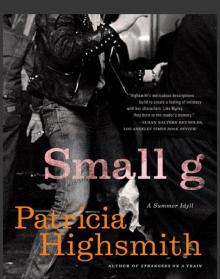 Small G: A Summer Idyll
Small G: A Summer Idyll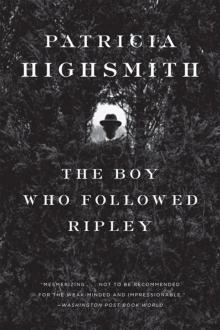 The Boy Who Followed Ripley
The Boy Who Followed Ripley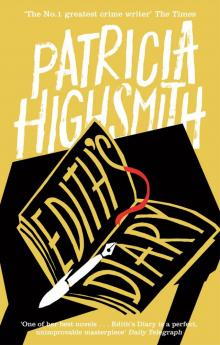 Edith's Diary
Edith's Diary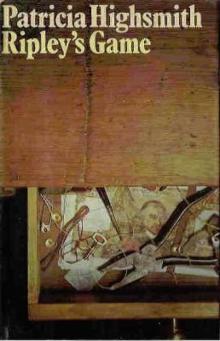 Ripley's Game
Ripley's Game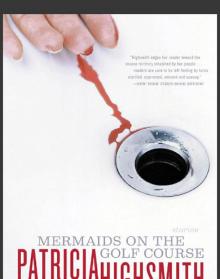 Mermaids on the Golf Course: Stories
Mermaids on the Golf Course: Stories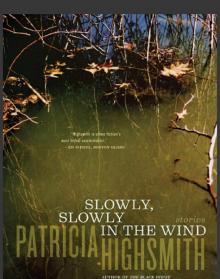 Slowly, Slowly in the Wind
Slowly, Slowly in the Wind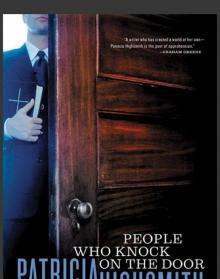 People Who Knock on the Door
People Who Knock on the Door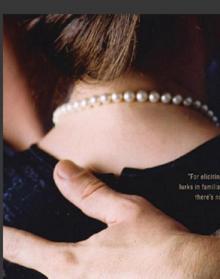 The Glass Cell
The Glass Cell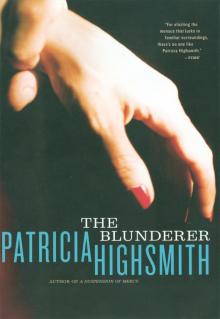 The Blunderer
The Blunderer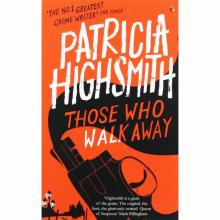 Those Who Walk Away
Those Who Walk Away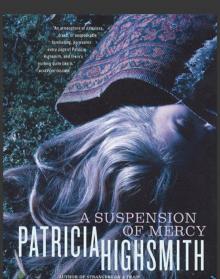 A Suspension of Mercy
A Suspension of Mercy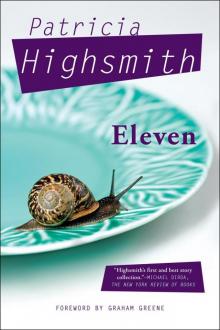 Eleven
Eleven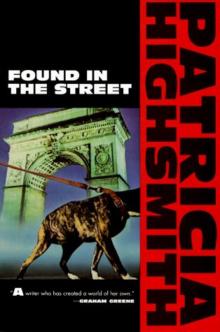 Found in the Street
Found in the Street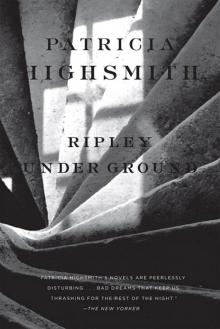 Ripley Under Ground
Ripley Under Ground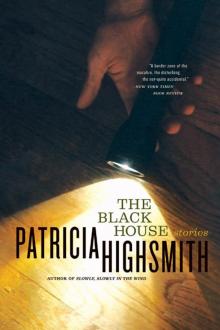 The Black House
The Black House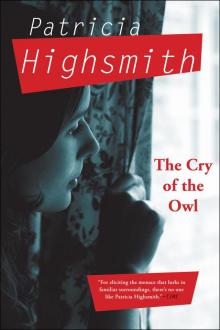 The Cry of the Owl
The Cry of the Owl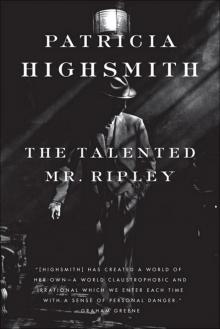 The Talented Mr. Ripley
The Talented Mr. Ripley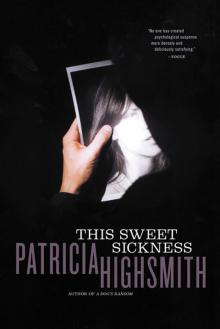 This Sweet Sickness
This Sweet Sickness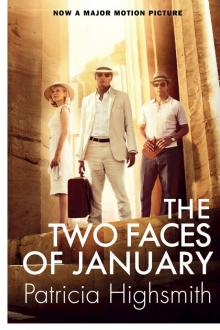 The Two Faces of January
The Two Faces of January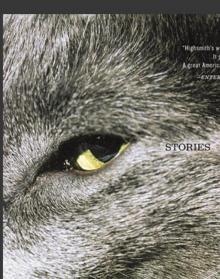 The Animal-Lover's Book of Beastly Murder
The Animal-Lover's Book of Beastly Murder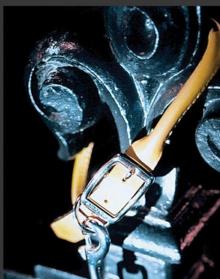 A Dog's Ransom
A Dog's Ransom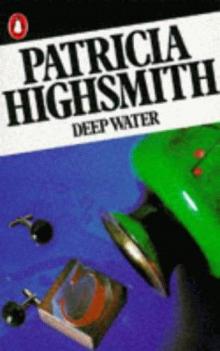 Deep Water
Deep Water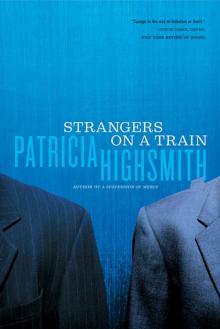 Strangers on a Train
Strangers on a Train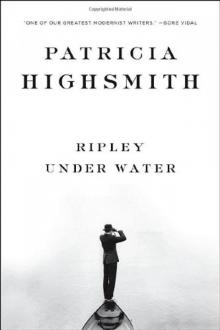 Ripley Under Water
Ripley Under Water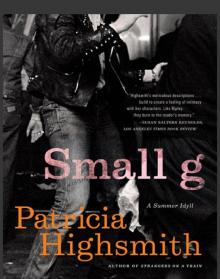 Small g
Small g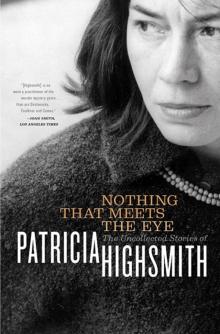 Nothing That Meets the Eye
Nothing That Meets the Eye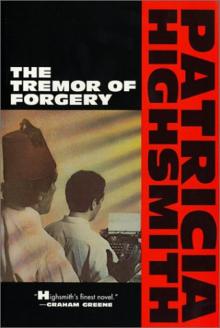 Patricia Highsmith - The Tremor of Forgery
Patricia Highsmith - The Tremor of Forgery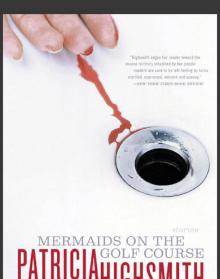 Mermaids on the Golf Course
Mermaids on the Golf Course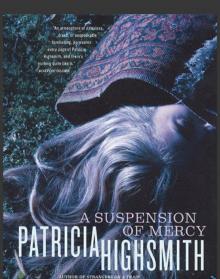 Suspension of Mercy
Suspension of Mercy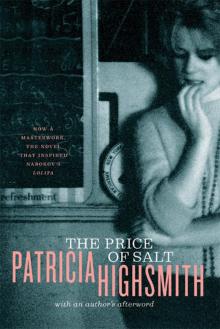 The Price of Salt, or Carol
The Price of Salt, or Carol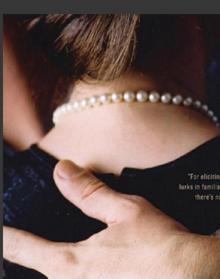 Glass Cell
Glass Cell